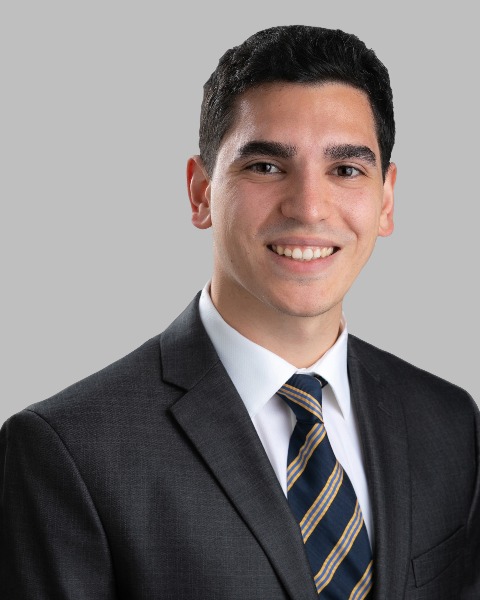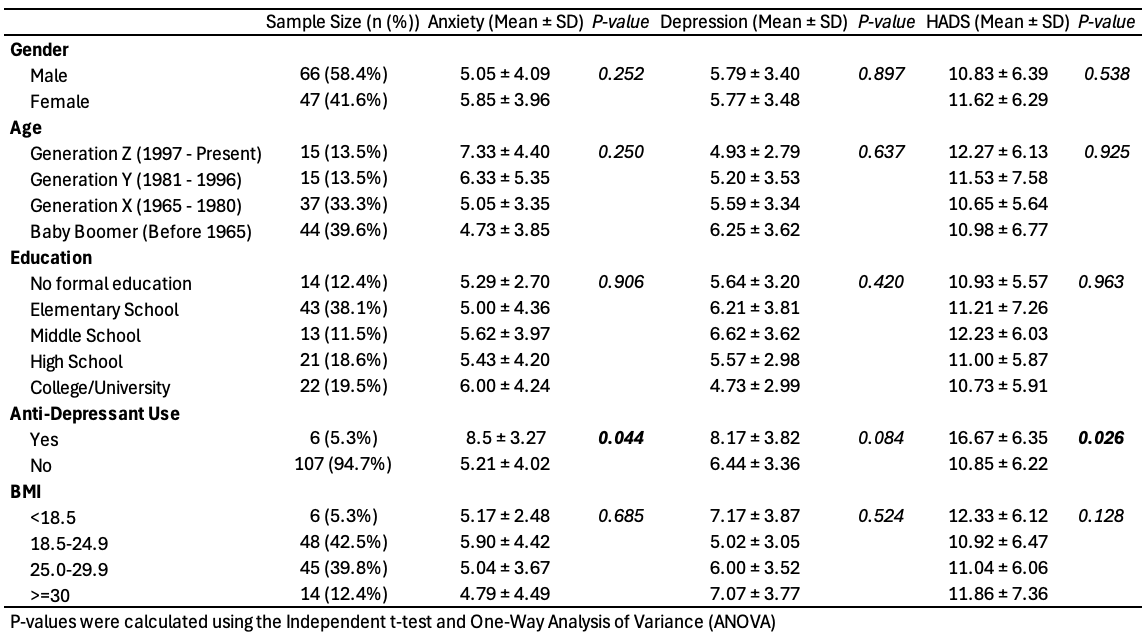Monday Poster Session
Category: Liver
P3659 - Anxiety and Depression Outcomes in Liver Transplant Candidates and Recipients Using the Hospital Anxiety and Depression Scale
Monday, October 27, 2025
10:30 AM - 4:00 PM PDT
Location: Exhibit Hall

Ali Emre Bardak, MD
St. Elizabeth's Medical Center, Boston University School of Medicine
Boston, MA
Presenting Author(s)
Ali Emre Bardak, MD1, Asli Cifcibasi Ormeci, MD2, Zuhal Yildiz, MD2, Volkan Senkal, MD2, Ziya Imanov, MD2, Zulal Istemihan, MD2, Kanan Nuriyev, MD2, Aynura Rustamzada, MD2, Sezen Genc, MD2, Filiz Akyuz, MD2, Kadir Demir, MD2, Fatih Besisik, MD2, Sabahattin Kaymakoglu, MD2, Bilger Cavus, MD2
1St. Elizabeth's Medical Center, Boston University School of Medicine, Boston, MA; 2Istanbul University, Istanbul, Istanbul, Turkey
Introduction: Liver transplantation is a life-saving treatment for patients with end-stage liver disease, but it is associated with significant psychological burdens, including anxiety and depression. They can manifest with varying severity across different subgroups of patients. This study aimed to evaluate the anxiety and depression of this population using the Hospital Anxiety and Depression Scale (HADS) and to identify associated demographic and clinical risk factors.
Methods: This study included 113 liver transplant candidates and recipients. Excluded were those < 3 months post-transplant, hospitalized in the past 3 months, relisted after a prior transplant, receiving palliative care, with psychiatric disorders besides anxiety and depression, cognitive-impairing conditions, suicidal ideation, or lacking decision-making capacity. Anxiety and depression were assessed using the HADS with an anonymous questionnaire. Subgroup analyses were conducted based on transplant status, donor type, gender, age, body mass index (BMI), education level, and antidepressant use.
Results: The mean overall HADS score was 11.16. Although female participants showed slightly higher mean anxiety, depression, and overall HADS scores, the differences were not statistically significant (Table 1). Generation Z had the highest anxiety scores (significantly greater than Generation X, p=0.048, and Baby Boomers, p=0.034), while Baby Boomers had the highest, albeit non-significant, depression scores. Education level and BMI categories showed no significant group differences. Individuals taking antidepressants had significantly elevated anxiety (p=0.044) and overall HADS (p=0.026) scores. Among candidates, having a confirmed living donor was associated with significantly lower depression (p=0.034) and overall HADS (p=0.043) (Table 2). Time since transplantation showed no significant correlation with psychological outcomes.
Discussion: Anxiety and depression substantially impact morbidity and mortality during the peri-transplant period. Thus, identifying at-risk groups and taking preventive measures is essential. Younger liver transplant patients have higher anxiety, while older patients show greater depression. Candidates with a confirmed living donor report lower depression and overall psychological distress. BMI and education level have no significant effect on anxiety or depression. Raising awareness for the recognition of the psychological aspect of the transplantation is critical to improve clinical outcomes in this population.

Figure: Table 1: Subgroup Analysis of Anxiety, Depression, and HADS Scores Among Liver Transplant Candidates and Recipients.

Figure: Table 2: Comparative Analysis of Anxiety and Depression by the Transplant Type and Status
Disclosures:
Ali Emre Bardak indicated no relevant financial relationships.
Asli Cifcibasi Ormeci indicated no relevant financial relationships.
Zuhal Yildiz indicated no relevant financial relationships.
Volkan Senkal indicated no relevant financial relationships.
Ziya Imanov indicated no relevant financial relationships.
Zulal Istemihan indicated no relevant financial relationships.
Kanan Nuriyev indicated no relevant financial relationships.
Aynura Rustamzada indicated no relevant financial relationships.
Sezen Genc indicated no relevant financial relationships.
Filiz Akyuz indicated no relevant financial relationships.
Kadir Demir indicated no relevant financial relationships.
Fatih Besisik indicated no relevant financial relationships.
Sabahattin Kaymakoglu indicated no relevant financial relationships.
Bilger Cavus indicated no relevant financial relationships.
Ali Emre Bardak, MD1, Asli Cifcibasi Ormeci, MD2, Zuhal Yildiz, MD2, Volkan Senkal, MD2, Ziya Imanov, MD2, Zulal Istemihan, MD2, Kanan Nuriyev, MD2, Aynura Rustamzada, MD2, Sezen Genc, MD2, Filiz Akyuz, MD2, Kadir Demir, MD2, Fatih Besisik, MD2, Sabahattin Kaymakoglu, MD2, Bilger Cavus, MD2. P3659 - Anxiety and Depression Outcomes in Liver Transplant Candidates and Recipients Using the Hospital Anxiety and Depression Scale, ACG 2025 Annual Scientific Meeting Abstracts. Phoenix, AZ: American College of Gastroenterology.
1St. Elizabeth's Medical Center, Boston University School of Medicine, Boston, MA; 2Istanbul University, Istanbul, Istanbul, Turkey
Introduction: Liver transplantation is a life-saving treatment for patients with end-stage liver disease, but it is associated with significant psychological burdens, including anxiety and depression. They can manifest with varying severity across different subgroups of patients. This study aimed to evaluate the anxiety and depression of this population using the Hospital Anxiety and Depression Scale (HADS) and to identify associated demographic and clinical risk factors.
Methods: This study included 113 liver transplant candidates and recipients. Excluded were those < 3 months post-transplant, hospitalized in the past 3 months, relisted after a prior transplant, receiving palliative care, with psychiatric disorders besides anxiety and depression, cognitive-impairing conditions, suicidal ideation, or lacking decision-making capacity. Anxiety and depression were assessed using the HADS with an anonymous questionnaire. Subgroup analyses were conducted based on transplant status, donor type, gender, age, body mass index (BMI), education level, and antidepressant use.
Results: The mean overall HADS score was 11.16. Although female participants showed slightly higher mean anxiety, depression, and overall HADS scores, the differences were not statistically significant (Table 1). Generation Z had the highest anxiety scores (significantly greater than Generation X, p=0.048, and Baby Boomers, p=0.034), while Baby Boomers had the highest, albeit non-significant, depression scores. Education level and BMI categories showed no significant group differences. Individuals taking antidepressants had significantly elevated anxiety (p=0.044) and overall HADS (p=0.026) scores. Among candidates, having a confirmed living donor was associated with significantly lower depression (p=0.034) and overall HADS (p=0.043) (Table 2). Time since transplantation showed no significant correlation with psychological outcomes.
Discussion: Anxiety and depression substantially impact morbidity and mortality during the peri-transplant period. Thus, identifying at-risk groups and taking preventive measures is essential. Younger liver transplant patients have higher anxiety, while older patients show greater depression. Candidates with a confirmed living donor report lower depression and overall psychological distress. BMI and education level have no significant effect on anxiety or depression. Raising awareness for the recognition of the psychological aspect of the transplantation is critical to improve clinical outcomes in this population.

Figure: Table 1: Subgroup Analysis of Anxiety, Depression, and HADS Scores Among Liver Transplant Candidates and Recipients.

Figure: Table 2: Comparative Analysis of Anxiety and Depression by the Transplant Type and Status
Disclosures:
Ali Emre Bardak indicated no relevant financial relationships.
Asli Cifcibasi Ormeci indicated no relevant financial relationships.
Zuhal Yildiz indicated no relevant financial relationships.
Volkan Senkal indicated no relevant financial relationships.
Ziya Imanov indicated no relevant financial relationships.
Zulal Istemihan indicated no relevant financial relationships.
Kanan Nuriyev indicated no relevant financial relationships.
Aynura Rustamzada indicated no relevant financial relationships.
Sezen Genc indicated no relevant financial relationships.
Filiz Akyuz indicated no relevant financial relationships.
Kadir Demir indicated no relevant financial relationships.
Fatih Besisik indicated no relevant financial relationships.
Sabahattin Kaymakoglu indicated no relevant financial relationships.
Bilger Cavus indicated no relevant financial relationships.
Ali Emre Bardak, MD1, Asli Cifcibasi Ormeci, MD2, Zuhal Yildiz, MD2, Volkan Senkal, MD2, Ziya Imanov, MD2, Zulal Istemihan, MD2, Kanan Nuriyev, MD2, Aynura Rustamzada, MD2, Sezen Genc, MD2, Filiz Akyuz, MD2, Kadir Demir, MD2, Fatih Besisik, MD2, Sabahattin Kaymakoglu, MD2, Bilger Cavus, MD2. P3659 - Anxiety and Depression Outcomes in Liver Transplant Candidates and Recipients Using the Hospital Anxiety and Depression Scale, ACG 2025 Annual Scientific Meeting Abstracts. Phoenix, AZ: American College of Gastroenterology.
